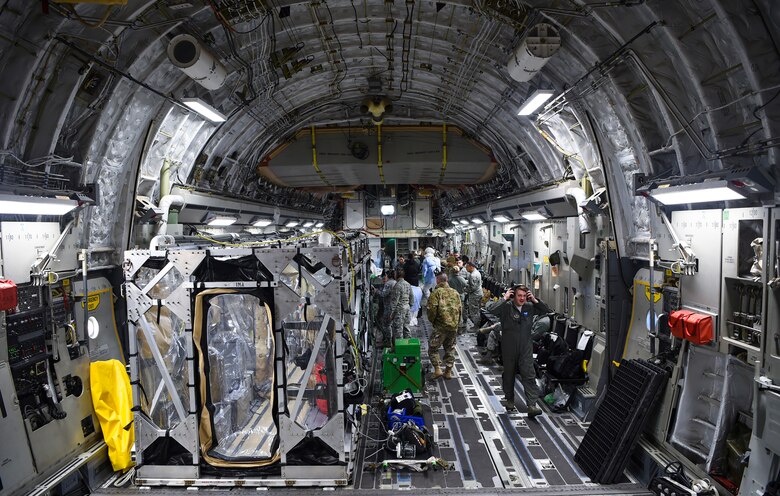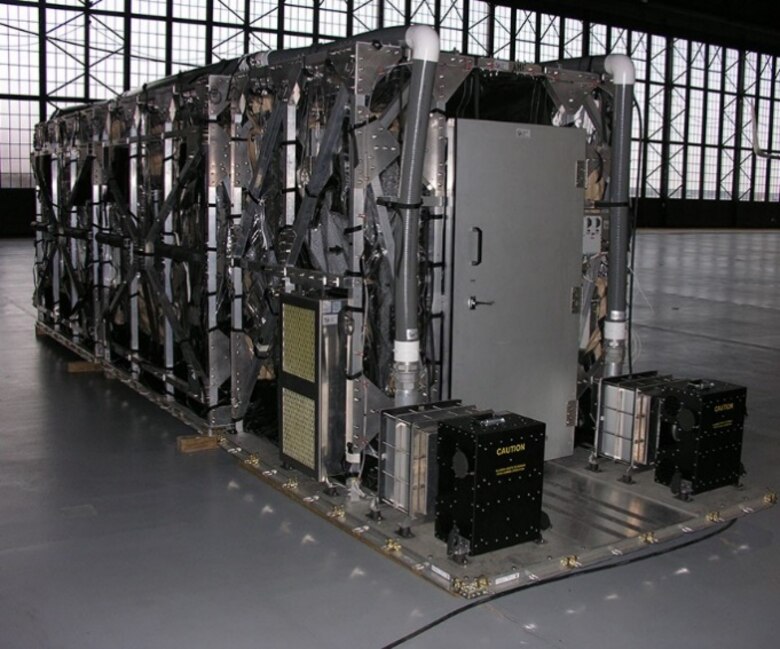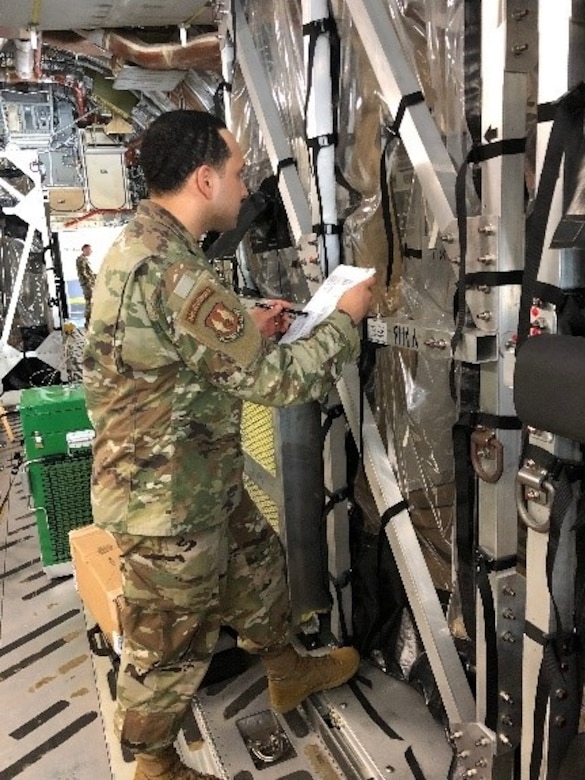With military medical professionals around the world tackling COVID-19 head on, teams from other mission areas continue stepping forward to do what they can to stop the spread of the deadly virus.
The Air Force Installation Contracting Center's 763rd Specialized Contracting Squadron is one example of mission-focused agility in support of the greater fight, recently delivering a surplus of fast-tracked emergency support to Air Mobility Command in days, if not hours.
The squadron's first success involved the expedited movement of transport isolation systems from a vendor in St. Louis to Joint Base Charleston, South Carolina.
The TIS units, secured inside military transport aircraft, are considered vital in reducing the risk to medical teams and aircrews when transporting patients with medical conditions like COVID-19. The units consist of three areas - two pods for the care of one patient in each and a third space where medics safely decontaminate and remove personal protective equipment.
"Each member of the 763rd team carries a solid and heavy workload," said Maj. Jimmy Thompson, 763rd SCONS deputy director. "But when the calls came in, the team was able to efficiently and effectively prioritize to ensure these emergency acquisitions were accomplished, working from home on a Sunday, missing time with their families and working through the night."
In addition to getting the units to JB Charleston, SCONS quickly secured additional training to get medics and aircrew members ready to safely deploy and use the systems.
The squadron received the training request from AMC on a Thursday afternoon and awarded the contract less than 24 hours later, Thompson said. Shortly after, training on the assembly and functional validation of the TIS units began.
Treating patients in place "is always the preferred option," said Lt. Gen. Jon Thomas, AMC deputy commander, but "we anticipate there will likely be circumstances in which such care will not be available, and the best option will be to transport the patient to alternative facilities."
Deeming TIS biocontainment units as "the best means to transport a COVID-positive patient," Thomas said the Air Force now stands ready to transport small numbers of patients if needed, thanks in no small part to the 763rd SCONS.
While some members of the squadron were busy securing the TIS units and required training, others were working through an emergency requirement for the decontamination of an aircraft that had transported an active-duty member with the virus.
Within 72 hours, the team had executed an emergency acquisition for the aircraft and had a mechanism for future decontamination requirements in place.
With all of these contracting actions going on, there was still another emergency ask from the AMC medical community - ventilators
The contracting team already had a medical readiness contract in place - to include a follow-on contract in January 2020 - that included a mission-essential services option. Due to the pandemic, 763rd SCONS invoked the contract option to get 500 ventilators "mission ready" and packaged for airlift within 24 hours, and have another 400 on mission standby. To make sure the ventilators were fully functional and calibrated, the SCONS team also quickly executed a separate emergency acquisition.
Problem-solving, research and collaboration with contractors and mission partners was key to delivering almost-immediate supplies and services in the fight against the COVID-19 pandemic, Thompson said.
"(As requests came in) nobody on the team flinched," the major said. "It was amazing to see the fire and energy our team had taken on, as they were experiencing … some for the first time … how powerful contracting and procuring supplies and services can be in a contingency or emergency environment."
"The 763rd SCONS professionals truly demonstrated AFICC's mission of 'fly, fight and win - through agile, innovative and mission-focused business solutions,'" added Col. Jonathon Wright, AFICC operating location AMC support director. "They were innovative in using various ways to collaborate together, with AMC's surgeon general and the contractors … and they were agile in delivering the business solutions to support the aeromedical evacuation mission."
In a recent message to the AFIMSC enterprise, Maj. Gen. Tom Wilcox congratulated the contracting professionals for their "hard work, quick reaction and just plain dedication to taking care of folks during these trying times … providing our nation with yet another option to treat positive COVID-19 cases.
"This is how we'll beat COVID and win," he said, "… with innovation, dedication and fast action by great Americans like you!"

A C-17 Globemaster III is prepped to transport a transportation isolation system, March 6, 2019, during a training exercise that allows Airmen to practice the most effective and safest form of transportation for patients and their medical professionals. Engineered and implemented after the Ebola virus outbreak in 2014, the TIS is an enclosure the Department of Defense can use to safely transport patients with highly contagious diseases. (U.S. Air Force photo by Senior Airman Cody R. Miller)

The transport isolation system, or TIS, is an infectious disease containment unit designed to minimize risk to aircrew, medical attendants and the airframe, while allowing medical care to be provided to patients in-flight. (U.S. Air Force courtesy photo)

Tech. Sgt. Victor Kipping-Cordoba stands outside a transport isolation system, or TIS, and provides instruction to an aeromedical evacuation member inside during a training session at Joint Base Charleston, S.C., March 27, 2020. Kipping-Cordoba and others are training other medical professionals to use the TIS to safely transport patients with highly contagious diseases. (U.S. Air Force photo by Lt. Col. Elizabeth Schnaubelt)






